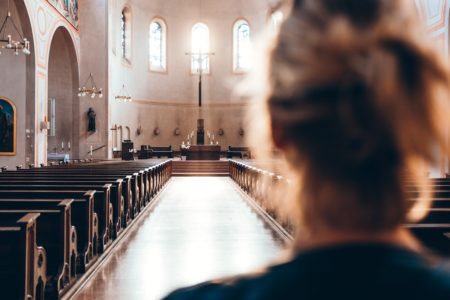By Sally Douglas
It is very easy to turn God into our own image. To make ideas of God – what God looks like, what God wants and who God loves – conform to the shape of our own beliefs. This happens across Christian churches, and other faith traditions. It is increasingly clear this also happens in circles who claim to be “spiritual not religious”.
Many people who claim to be Christians assume Jesus was white, and Jesus wants them to be successful or rich. Sayings such as “God helps those who help themselves” are popular in such contexts.
Theology has consequences. Because of these kinds of beliefs, people can comfortably remain blind to the reality that black and brown people are targeted by the police far more than white people. Through this kind of thinking, people can ignore systems of injustice, justify hoarding wealth, and blame the poor for their own suffering.
The reality is that evidence indicates that Jesus, a Middle Eastern Jew, was not white. Furthermore, across the Gospels Jesus constantly calls people to give their money away. While people may claim that God helps those who help themselves, this saying is not in the Bible, and when we come into contact with how Jesus acts in the Gospels, any notion of this is dissolved.
Again and again, Jesus is described as helping people who can’t help themselves – the blind, the lepers, women who have been ostracised by their communities, and so many others. Perhaps even more confronting, Jesus is constantly described as caring for, and valuing, the very people who everyone else has written off as losers, misfits, failures and “sinners” – those who “deserve what is coming to them”.
So how do we Christians – Christ Ones – protect ourselves from making Jesus into our own personal “yes man”, the one who endlessly confirms what we already want to believe about ourselves, others, and God? How do we guard against making God in our own image, instead of letting Jesus – the image of God – shape us?
This is central to the work of going to church.
It is in the challenging practice of coming back again and again as a community to hear these accounts of who and how Jesus is, that we are changed. It is in the practice of together being confronted by the strange truth that Jesus embodies divine power in extraordinary gentleness and fierce compassion, that we guard against idolatry.
As we wrestle with the Gospels week by week, we are encountered by Jesus, the God One, who never uses divine power to take advantage of people, to lord it over them, or punish them. In contrast, in the Gospels we are confronted by this God One, who consistently uses divine power to include, heal, challenge, liberate, forgive, and lift up. And who says follow me in this way of being.
As churches come out of extended lockdown and think about worshipping together in person, this is an ideal time to take stock of what we are doing in worship and why.
In order to protect ourselves from turning God into our own image, in order to create space for the God who comes to us in Jesus to confront us, I think there are core things about worship that need to be in place.
We need preachers, lay and ordained, who know that preaching is serious work. Phoning it in by plagiarising someone else’s sermon, lifting something from the internet, or cobbling together a sermon on a Saturday night that aims to entertain, will not guard against the dangers of idolatry (our own and others). Instead, it is in the practice of daring to spend prayerful time with the readings – letting these annoying words challenge us before we write a single word – that the power of liberation resides.
Alongside this grounded, prayer-soaked preaching, worship also needs to create space for those who gather to actually engage their intellect, spirit and heart, in the preaching, but also in the prayer, in the quiet, in the sacraments of Holy Communion and baptism, in the music, in blessings, and in discussions.
It is in the ongoing work of allowing ourselves to be open to the God who comes to us in Jesus and who reaches out to us in Great Spirit, that we are disentangled from the idols we make, and the idols we have been given by parents, peers, and culture.
This is why we go to church, to be dismantled and remade, over and over, so that we may join with others in the wild, inconvenient and compassionate way of God.
Rev Dr Sally Douglas is Minister at Richmond UC.



